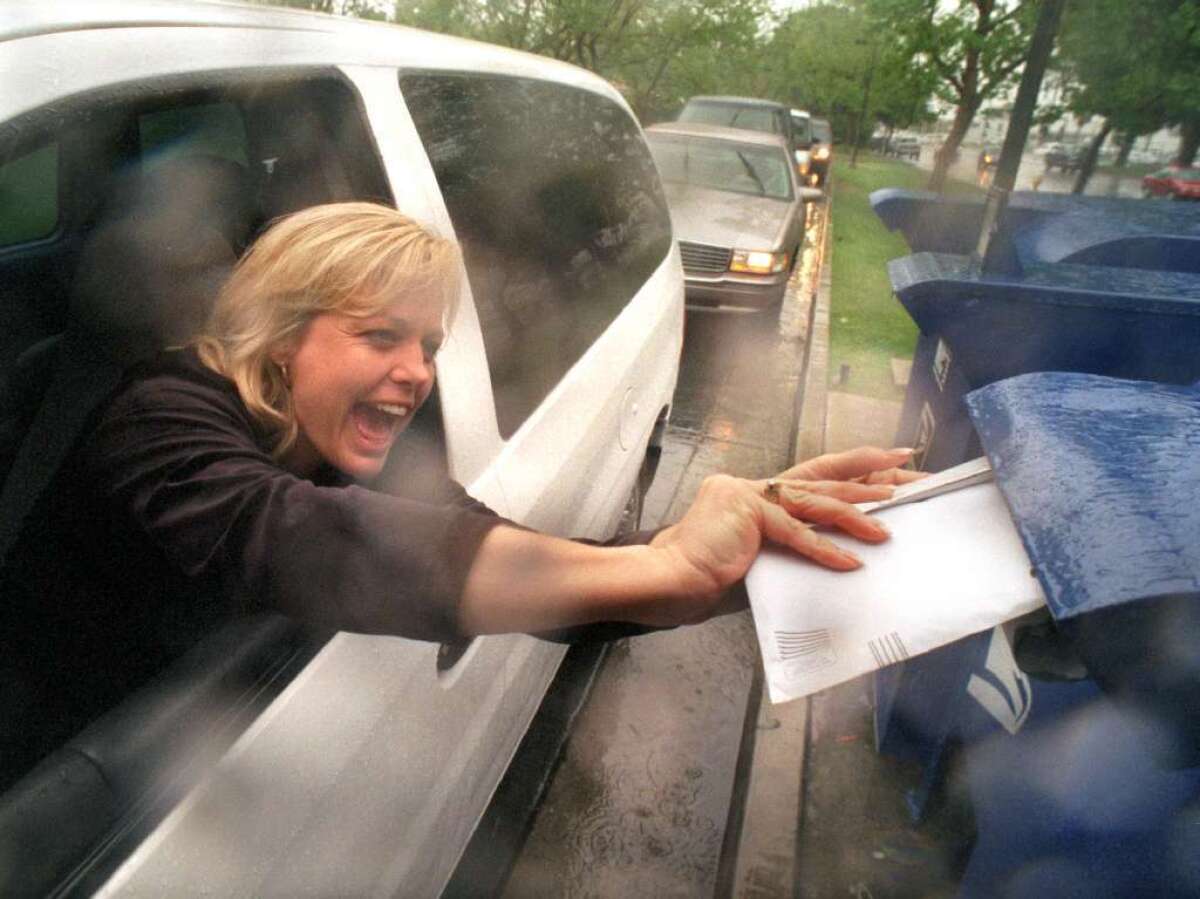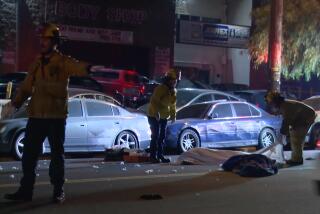Death and taxes: Why tax day may be hazardous to your health

Drivers in Thousand Oaks line up to mail their income tax returns. Researchers have found that the risk of fatal car crashes rises when taxes are due.
Do you dread tax day? If so, your instincts are good – though your anxiety is probably misdirected.
Sending your hard-earned money to the government may bring on chest pains, but the real risk to your health on April 15 is that you could die in a car crash.
The threat isn’t huge – about 13 more deaths than on a typical weekday – but it is real, researchers have found. That amounts to a 6% increase, according to a study in the Journal of the American Medical Assn.
To figure this out, Canadian researchers (who pay their taxes on April 30) examined 30 years of records from the Fatality Analysis Reporting System. This database is maintained by the National Highway Traffic Safety Administration, and it tallies every single motor vehicle crash on a U.S. public road that results in at least one death within 30 days of the accident.
The Canadians – led by Dr. Donald Redelmeier, a senior scientist at the Sunnybrook Research Institute in Toronto – looked up the number of such deaths for every tax day between 1980 and 2009. (If April 15 falls on a weekend, tax day may be delayed until the 16th or 17th.) Victims include drivers, passengers, pedestrians and others who happen to be in the wrong place at the wrong time.
For the sake of comparison, the researchers also looked up deaths exactly one week before and one week after each tax day. These normal weekdays served as controls.
Sure enough, the average number of motor vehicle-related deaths on the tax days was 226. On the control days, the average number of such deaths was 213. Over the 30-year period, the total number of extra deaths on tax days was 404. The most common type of victim was a “young adult man driving in a rural location,” according to the study.
The data don’t reveal why crashes are more common on tax days. Alcohol probably isn’t a factor – the trend isn’t accentuated at night, when drinking is more common, the researchers wrote.
More likely, drivers are simply stressed out by their taxes and thus more prone to accidents. Making matters worse, these last-minute filers may be suffering from sleep deprivation after staying up late to finish their 1040s. They also may be driving on unfamiliar streets to find a post office that’s open late, according to the study.
Still, April 15 isn’t the most dangerous day on the American civic calendar. In a previous study published in JAMA, Redelmeier and his colleagues found that the risk of car crashes rose by 18% on days when voters went to the polls to select a new president. That meant about 24 additional deaths on election days, a figure that held steady regardless of whether a Democrat or a Republican won the White House.
Even worse is Super Bowl Sunday, Redelmeier and a collaborator reported in the New England Journal of Medicine. Though accidents were no more likely in the hours leading up to the big game and slightly less likely while the game is on TV, the risk of fatal crashes was 41% higher after the game than it was during the same hours on other Sundays.
But let’s get back to taxes.
Redelmeier and his coauthor Dr. Christopher Yarnell, who finished medical school at the University of Toronto last year, got so much feedback on their JAMA study that they elaborated on their research in a 2013 article published in Chance, a journal published by the American Statistical Assn.
They calculated that the health risks associated with fatal crashes on tax day cost society $40 million – enough to wipe out the income taxes paid by 5,000 Americans.
But the solution isn’t as simple as filing online to avoid the need to drive to the post office, they wrote. As long as you have to get behind the wheel while thinking about your tax return, the risk is likely to remain.
Instead, Redelmeier and Yarnell argued that the better fix would be to simplify the U.S. tax code so that it doesn’t cause so much stress. They noted that the size of the tax code nearly tripled over the 30-year period of their study.
Their prescription for tax reform isn’t likely to be filled soon. In the meantime, they suggest that drivers take extra care on tax day to make sure they buckle their seat belts, obey the speed limit and keep their eyes on the road.
“Death and taxes need not coincide if people could be slightly more reliable about road safety,” Redelmeier and Yarnell wrote in Chance.
For more science news you can use, follow me on Twitter @LATkarenkaplan and “like” Los Angeles Times Science & Health on Facebook.







